Analysis: Brexit's Impact on UK Organizations' Recruitment Strategies
VerifiedAdded on 2022/11/30
|15
|3708
|152
Report
AI Summary
This report analyzes the impact of Brexit on UK organizations' recruitment processes, based on data collected by YouGov plc. for the CIPD and The Adecco Group. The study, commissioned by a university business school for the UK government, examines the effects of Brexit on both public and private sectors, focusing on recruitment planning, redundancies, and the implications of the new immigration system. The analysis addresses key questions regarding recruitment plans, redundancy intentions, and the impact on overall headcount. Data from over 2000 organizations were analyzed to understand the changes in the labor market. Findings reveal insights into the hiring of EU nationals, and the overall effect of Brexit on employment levels and recruitment strategies. The report provides recommendations to the government based on the data analysis, offering a comprehensive overview of the challenges and opportunities in the post-Brexit UK labor market.

Report and data in excel
Paraphrase This Document
Need a fresh take? Get an instant paraphrase of this document with our AI Paraphraser
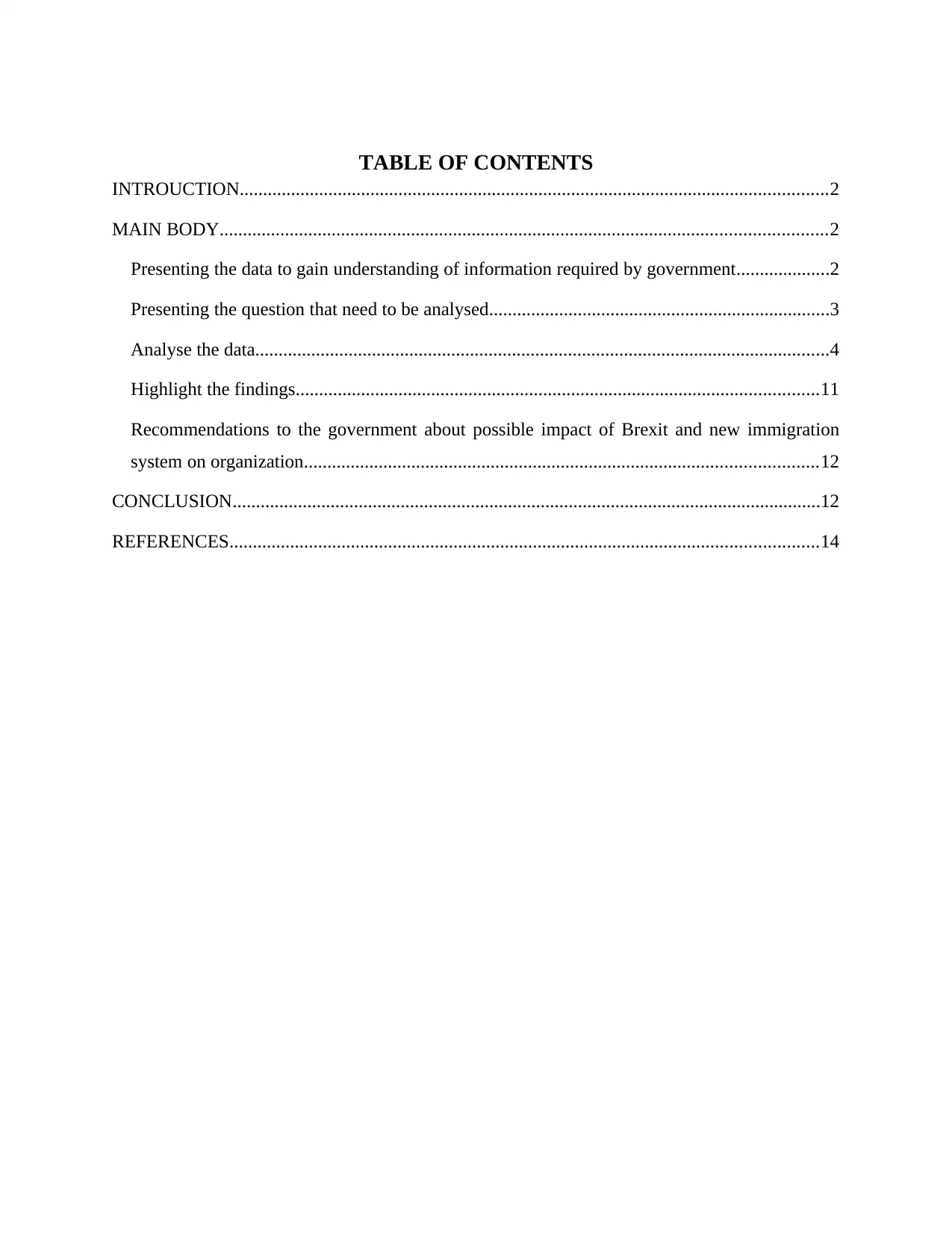
TABLE OF CONTENTS
INTROUCTION..............................................................................................................................2
MAIN BODY..................................................................................................................................2
Presenting the data to gain understanding of information required by government....................2
Presenting the question that need to be analysed.........................................................................3
Analyse the data...........................................................................................................................4
Highlight the findings................................................................................................................11
Recommendations to the government about possible impact of Brexit and new immigration
system on organization..............................................................................................................12
CONCLUSION..............................................................................................................................12
REFERENCES..............................................................................................................................14
INTROUCTION..............................................................................................................................2
MAIN BODY..................................................................................................................................2
Presenting the data to gain understanding of information required by government....................2
Presenting the question that need to be analysed.........................................................................3
Analyse the data...........................................................................................................................4
Highlight the findings................................................................................................................11
Recommendations to the government about possible impact of Brexit and new immigration
system on organization..............................................................................................................12
CONCLUSION..............................................................................................................................12
REFERENCES..............................................................................................................................14
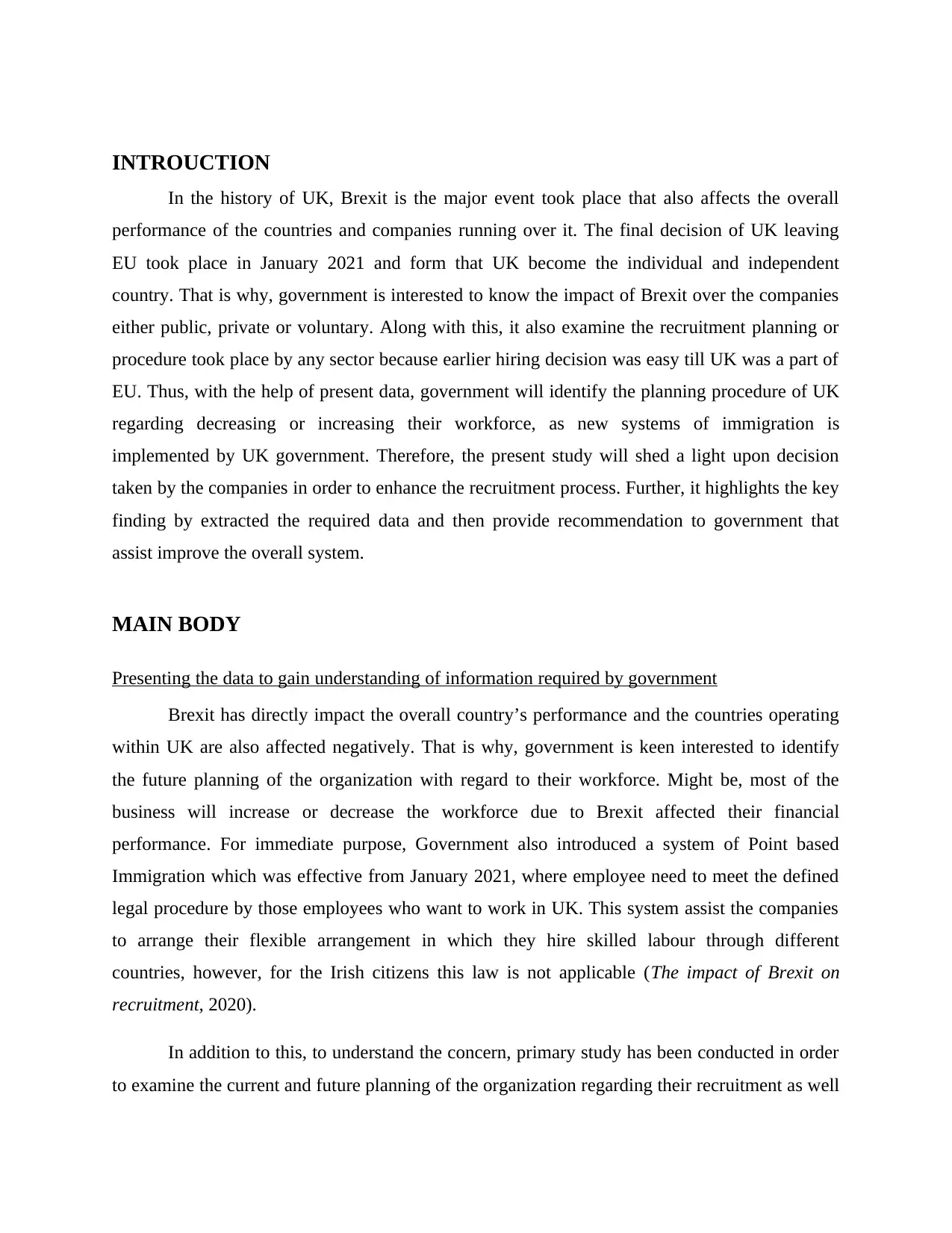
INTROUCTION
In the history of UK, Brexit is the major event took place that also affects the overall
performance of the countries and companies running over it. The final decision of UK leaving
EU took place in January 2021 and form that UK become the individual and independent
country. That is why, government is interested to know the impact of Brexit over the companies
either public, private or voluntary. Along with this, it also examine the recruitment planning or
procedure took place by any sector because earlier hiring decision was easy till UK was a part of
EU. Thus, with the help of present data, government will identify the planning procedure of UK
regarding decreasing or increasing their workforce, as new systems of immigration is
implemented by UK government. Therefore, the present study will shed a light upon decision
taken by the companies in order to enhance the recruitment process. Further, it highlights the key
finding by extracted the required data and then provide recommendation to government that
assist improve the overall system.
MAIN BODY
Presenting the data to gain understanding of information required by government
Brexit has directly impact the overall country’s performance and the countries operating
within UK are also affected negatively. That is why, government is keen interested to identify
the future planning of the organization with regard to their workforce. Might be, most of the
business will increase or decrease the workforce due to Brexit affected their financial
performance. For immediate purpose, Government also introduced a system of Point based
Immigration which was effective from January 2021, where employee need to meet the defined
legal procedure by those employees who want to work in UK. This system assist the companies
to arrange their flexible arrangement in which they hire skilled labour through different
countries, however, for the Irish citizens this law is not applicable (The impact of Brexit on
recruitment, 2020).
In addition to this, to understand the concern, primary study has been conducted in order
to examine the current and future planning of the organization regarding their recruitment as well
In the history of UK, Brexit is the major event took place that also affects the overall
performance of the countries and companies running over it. The final decision of UK leaving
EU took place in January 2021 and form that UK become the individual and independent
country. That is why, government is interested to know the impact of Brexit over the companies
either public, private or voluntary. Along with this, it also examine the recruitment planning or
procedure took place by any sector because earlier hiring decision was easy till UK was a part of
EU. Thus, with the help of present data, government will identify the planning procedure of UK
regarding decreasing or increasing their workforce, as new systems of immigration is
implemented by UK government. Therefore, the present study will shed a light upon decision
taken by the companies in order to enhance the recruitment process. Further, it highlights the key
finding by extracted the required data and then provide recommendation to government that
assist improve the overall system.
MAIN BODY
Presenting the data to gain understanding of information required by government
Brexit has directly impact the overall country’s performance and the countries operating
within UK are also affected negatively. That is why, government is keen interested to identify
the future planning of the organization with regard to their workforce. Might be, most of the
business will increase or decrease the workforce due to Brexit affected their financial
performance. For immediate purpose, Government also introduced a system of Point based
Immigration which was effective from January 2021, where employee need to meet the defined
legal procedure by those employees who want to work in UK. This system assist the companies
to arrange their flexible arrangement in which they hire skilled labour through different
countries, however, for the Irish citizens this law is not applicable (The impact of Brexit on
recruitment, 2020).
In addition to this, to understand the concern, primary study has been conducted in order
to examine the current and future planning of the organization regarding their recruitment as well
⊘ This is a preview!⊘
Do you want full access?
Subscribe today to unlock all pages.

Trusted by 1+ million students worldwide
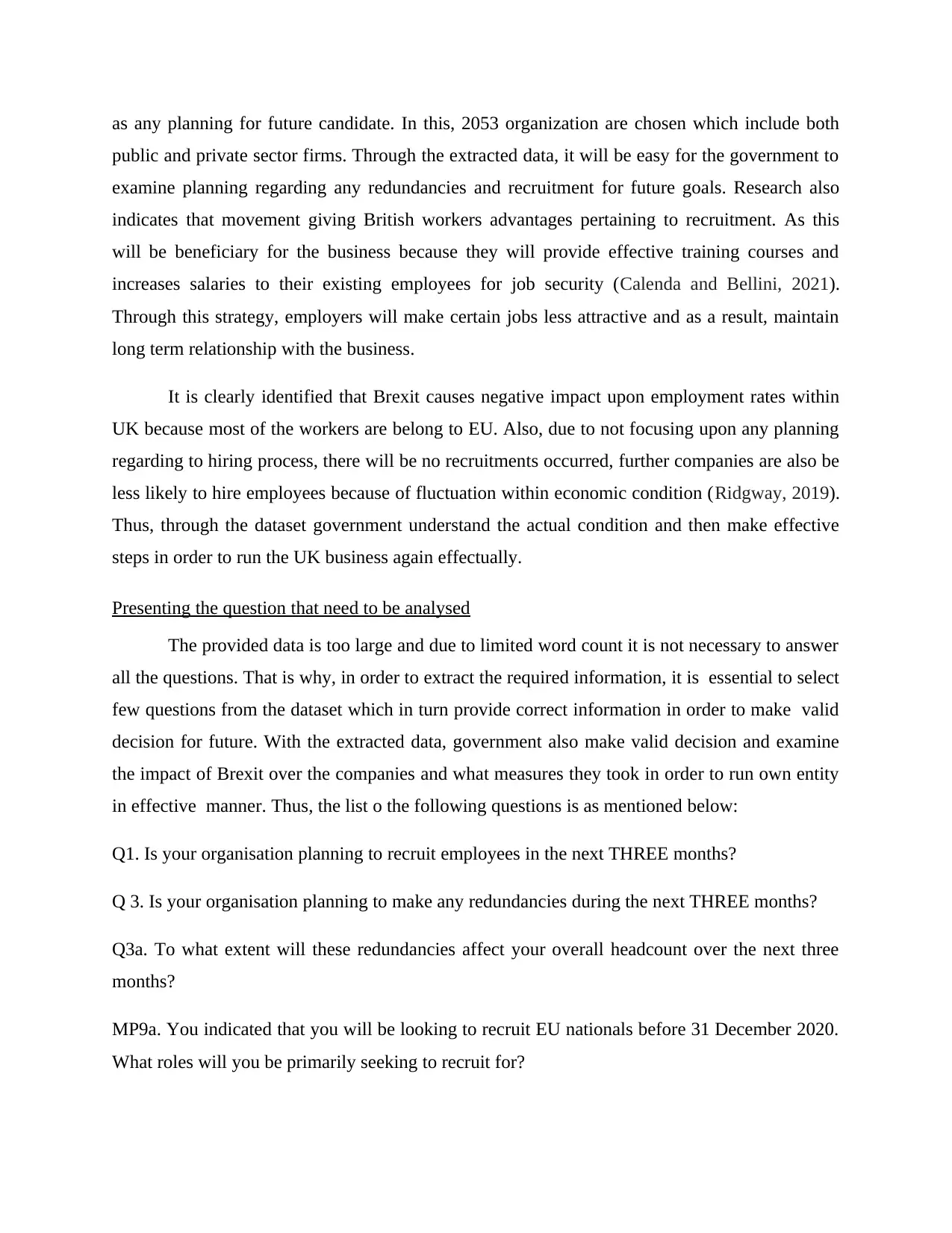
as any planning for future candidate. In this, 2053 organization are chosen which include both
public and private sector firms. Through the extracted data, it will be easy for the government to
examine planning regarding any redundancies and recruitment for future goals. Research also
indicates that movement giving British workers advantages pertaining to recruitment. As this
will be beneficiary for the business because they will provide effective training courses and
increases salaries to their existing employees for job security (Calenda and Bellini, 2021).
Through this strategy, employers will make certain jobs less attractive and as a result, maintain
long term relationship with the business.
It is clearly identified that Brexit causes negative impact upon employment rates within
UK because most of the workers are belong to EU. Also, due to not focusing upon any planning
regarding to hiring process, there will be no recruitments occurred, further companies are also be
less likely to hire employees because of fluctuation within economic condition (Ridgway, 2019).
Thus, through the dataset government understand the actual condition and then make effective
steps in order to run the UK business again effectually.
Presenting the question that need to be analysed
The provided data is too large and due to limited word count it is not necessary to answer
all the questions. That is why, in order to extract the required information, it is essential to select
few questions from the dataset which in turn provide correct information in order to make valid
decision for future. With the extracted data, government also make valid decision and examine
the impact of Brexit over the companies and what measures they took in order to run own entity
in effective manner. Thus, the list o the following questions is as mentioned below:
Q1. Is your organisation planning to recruit employees in the next THREE months?
Q 3. Is your organisation planning to make any redundancies during the next THREE months?
Q3a. To what extent will these redundancies affect your overall headcount over the next three
months?
MP9a. You indicated that you will be looking to recruit EU nationals before 31 December 2020.
What roles will you be primarily seeking to recruit for?
public and private sector firms. Through the extracted data, it will be easy for the government to
examine planning regarding any redundancies and recruitment for future goals. Research also
indicates that movement giving British workers advantages pertaining to recruitment. As this
will be beneficiary for the business because they will provide effective training courses and
increases salaries to their existing employees for job security (Calenda and Bellini, 2021).
Through this strategy, employers will make certain jobs less attractive and as a result, maintain
long term relationship with the business.
It is clearly identified that Brexit causes negative impact upon employment rates within
UK because most of the workers are belong to EU. Also, due to not focusing upon any planning
regarding to hiring process, there will be no recruitments occurred, further companies are also be
less likely to hire employees because of fluctuation within economic condition (Ridgway, 2019).
Thus, through the dataset government understand the actual condition and then make effective
steps in order to run the UK business again effectually.
Presenting the question that need to be analysed
The provided data is too large and due to limited word count it is not necessary to answer
all the questions. That is why, in order to extract the required information, it is essential to select
few questions from the dataset which in turn provide correct information in order to make valid
decision for future. With the extracted data, government also make valid decision and examine
the impact of Brexit over the companies and what measures they took in order to run own entity
in effective manner. Thus, the list o the following questions is as mentioned below:
Q1. Is your organisation planning to recruit employees in the next THREE months?
Q 3. Is your organisation planning to make any redundancies during the next THREE months?
Q3a. To what extent will these redundancies affect your overall headcount over the next three
months?
MP9a. You indicated that you will be looking to recruit EU nationals before 31 December 2020.
What roles will you be primarily seeking to recruit for?
Paraphrase This Document
Need a fresh take? Get an instant paraphrase of this document with our AI Paraphraser
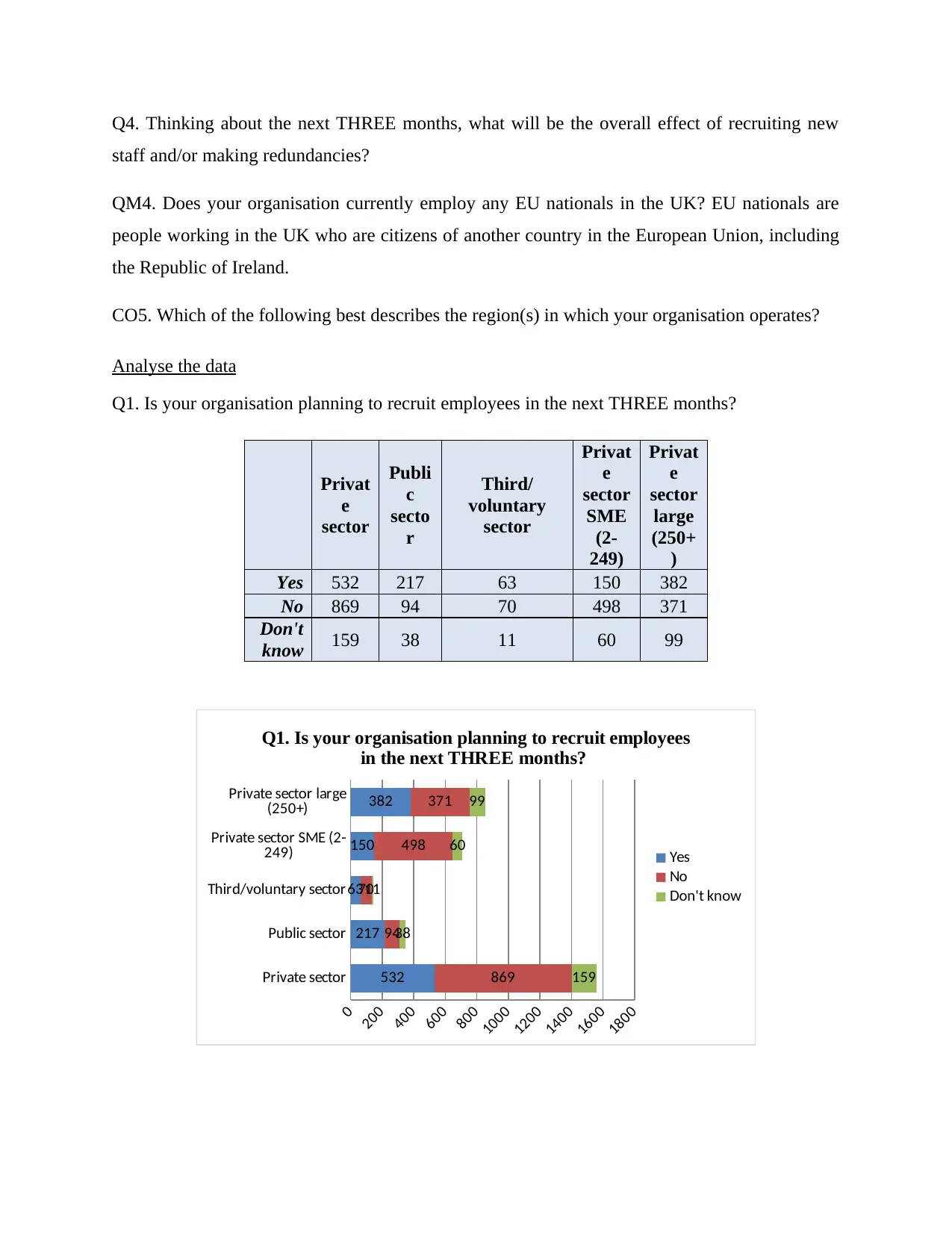
Q4. Thinking about the next THREE months, what will be the overall effect of recruiting new
staff and/or making redundancies?
QM4. Does your organisation currently employ any EU nationals in the UK? EU nationals are
people working in the UK who are citizens of another country in the European Union, including
the Republic of Ireland.
CO5. Which of the following best describes the region(s) in which your organisation operates?
Analyse the data
Q1. Is your organisation planning to recruit employees in the next THREE months?
Privat
e
sector
Publi
c
secto
r
Third/
voluntary
sector
Privat
e
sector
SME
(2-
249)
Privat
e
sector
large
(250+
)
Yes 532 217 63 150 382
No 869 94 70 498 371
Don't
know 159 38 11 60 99
Private sector
Public sector
Third/voluntary sector
Private sector SME (2-
249)
Private sector large
(250+)
0
200
400
600
800
1000
1200
1400
1600
1800
532
217
63
150
382
869
94
70
498
371
159
38
11
60
99
Q1. Is your organisation planning to recruit employees
in the next THREE months?
Yes
No
Don't know
staff and/or making redundancies?
QM4. Does your organisation currently employ any EU nationals in the UK? EU nationals are
people working in the UK who are citizens of another country in the European Union, including
the Republic of Ireland.
CO5. Which of the following best describes the region(s) in which your organisation operates?
Analyse the data
Q1. Is your organisation planning to recruit employees in the next THREE months?
Privat
e
sector
Publi
c
secto
r
Third/
voluntary
sector
Privat
e
sector
SME
(2-
249)
Privat
e
sector
large
(250+
)
Yes 532 217 63 150 382
No 869 94 70 498 371
Don't
know 159 38 11 60 99
Private sector
Public sector
Third/voluntary sector
Private sector SME (2-
249)
Private sector large
(250+)
0
200
400
600
800
1000
1200
1400
1600
1800
532
217
63
150
382
869
94
70
498
371
159
38
11
60
99
Q1. Is your organisation planning to recruit employees
in the next THREE months?
Yes
No
Don't know
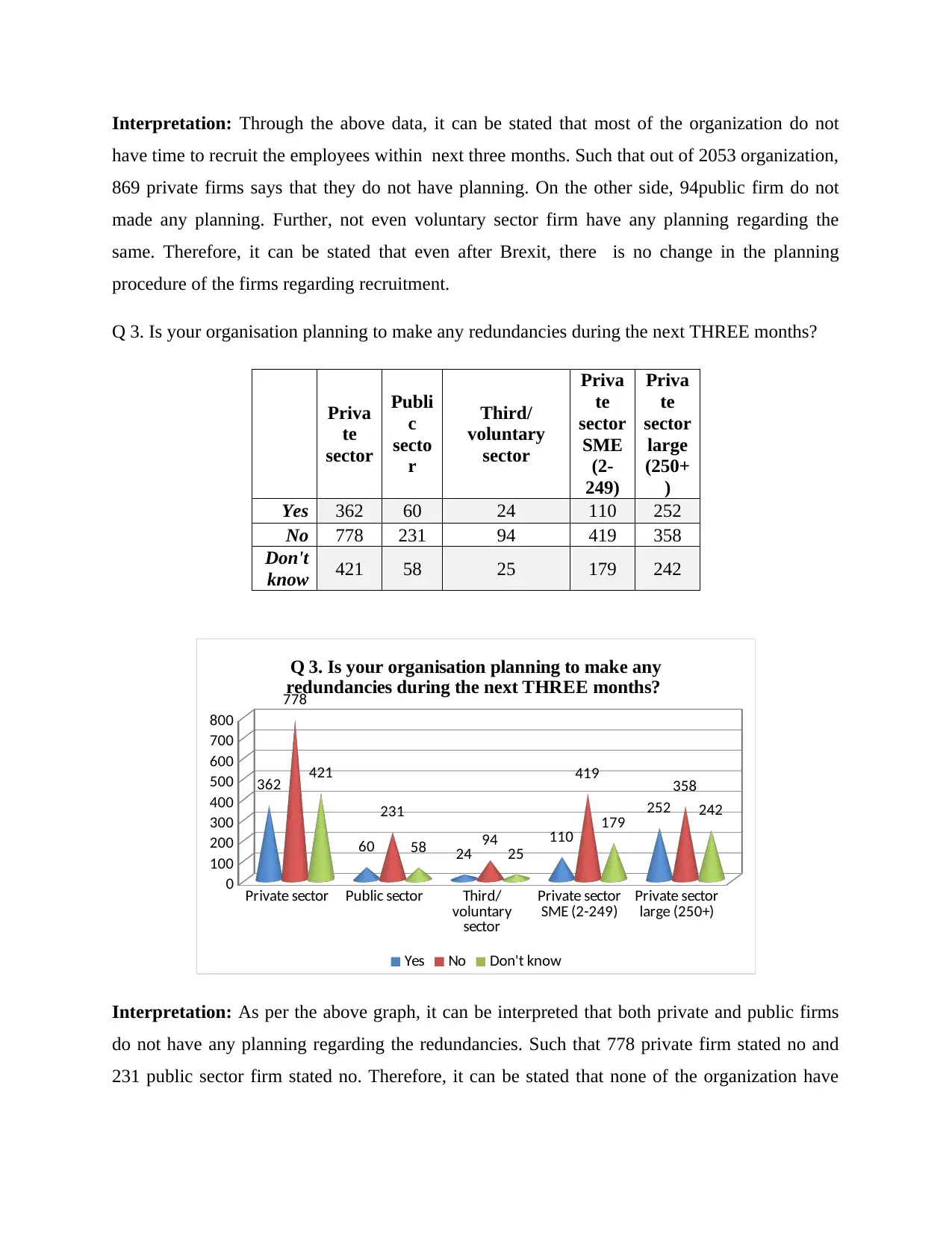
Interpretation: Through the above data, it can be stated that most of the organization do not
have time to recruit the employees within next three months. Such that out of 2053 organization,
869 private firms says that they do not have planning. On the other side, 94public firm do not
made any planning. Further, not even voluntary sector firm have any planning regarding the
same. Therefore, it can be stated that even after Brexit, there is no change in the planning
procedure of the firms regarding recruitment.
Q 3. Is your organisation planning to make any redundancies during the next THREE months?
Priva
te
sector
Publi
c
secto
r
Third/
voluntary
sector
Priva
te
sector
SME
(2-
249)
Priva
te
sector
large
(250+
)
Yes 362 60 24 110 252
No 778 231 94 419 358
Don't
know 421 58 25 179 242
Private sector Public sector Third/
voluntary
sector
Private sector
SME (2-249) Private sector
large (250+)
0
100
200
300
400
500
600
700
800
362
60 24
110
252
778
231
94
419 358
421
58 25
179 242
Q 3. Is your organisation planning to make any
redundancies during the next THREE months?
Yes No Don't know
Interpretation: As per the above graph, it can be interpreted that both private and public firms
do not have any planning regarding the redundancies. Such that 778 private firm stated no and
231 public sector firm stated no. Therefore, it can be stated that none of the organization have
have time to recruit the employees within next three months. Such that out of 2053 organization,
869 private firms says that they do not have planning. On the other side, 94public firm do not
made any planning. Further, not even voluntary sector firm have any planning regarding the
same. Therefore, it can be stated that even after Brexit, there is no change in the planning
procedure of the firms regarding recruitment.
Q 3. Is your organisation planning to make any redundancies during the next THREE months?
Priva
te
sector
Publi
c
secto
r
Third/
voluntary
sector
Priva
te
sector
SME
(2-
249)
Priva
te
sector
large
(250+
)
Yes 362 60 24 110 252
No 778 231 94 419 358
Don't
know 421 58 25 179 242
Private sector Public sector Third/
voluntary
sector
Private sector
SME (2-249) Private sector
large (250+)
0
100
200
300
400
500
600
700
800
362
60 24
110
252
778
231
94
419 358
421
58 25
179 242
Q 3. Is your organisation planning to make any
redundancies during the next THREE months?
Yes No Don't know
Interpretation: As per the above graph, it can be interpreted that both private and public firms
do not have any planning regarding the redundancies. Such that 778 private firm stated no and
231 public sector firm stated no. Therefore, it can be stated that none of the organization have
⊘ This is a preview!⊘
Do you want full access?
Subscribe today to unlock all pages.

Trusted by 1+ million students worldwide
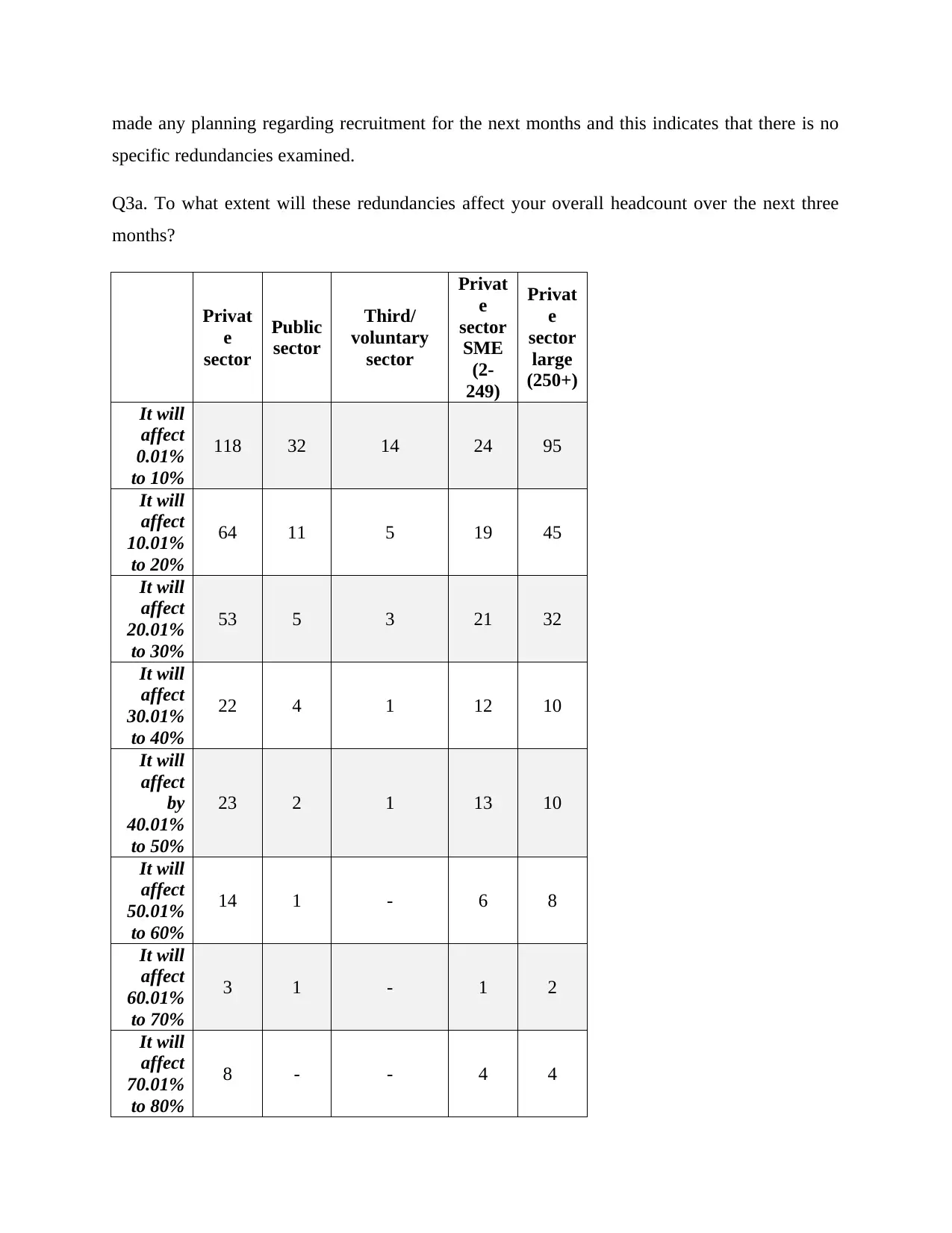
made any planning regarding recruitment for the next months and this indicates that there is no
specific redundancies examined.
Q3a. To what extent will these redundancies affect your overall headcount over the next three
months?
Privat
e
sector
Public
sector
Third/
voluntary
sector
Privat
e
sector
SME
(2-
249)
Privat
e
sector
large
(250+)
It will
affect
0.01%
to 10%
118 32 14 24 95
It will
affect
10.01%
to 20%
64 11 5 19 45
It will
affect
20.01%
to 30%
53 5 3 21 32
It will
affect
30.01%
to 40%
22 4 1 12 10
It will
affect
by
40.01%
to 50%
23 2 1 13 10
It will
affect
50.01%
to 60%
14 1 - 6 8
It will
affect
60.01%
to 70%
3 1 - 1 2
It will
affect
70.01%
to 80%
8 - - 4 4
specific redundancies examined.
Q3a. To what extent will these redundancies affect your overall headcount over the next three
months?
Privat
e
sector
Public
sector
Third/
voluntary
sector
Privat
e
sector
SME
(2-
249)
Privat
e
sector
large
(250+)
It will
affect
0.01%
to 10%
118 32 14 24 95
It will
affect
10.01%
to 20%
64 11 5 19 45
It will
affect
20.01%
to 30%
53 5 3 21 32
It will
affect
30.01%
to 40%
22 4 1 12 10
It will
affect
by
40.01%
to 50%
23 2 1 13 10
It will
affect
50.01%
to 60%
14 1 - 6 8
It will
affect
60.01%
to 70%
3 1 - 1 2
It will
affect
70.01%
to 80%
8 - - 4 4
Paraphrase This Document
Need a fresh take? Get an instant paraphrase of this document with our AI Paraphraser
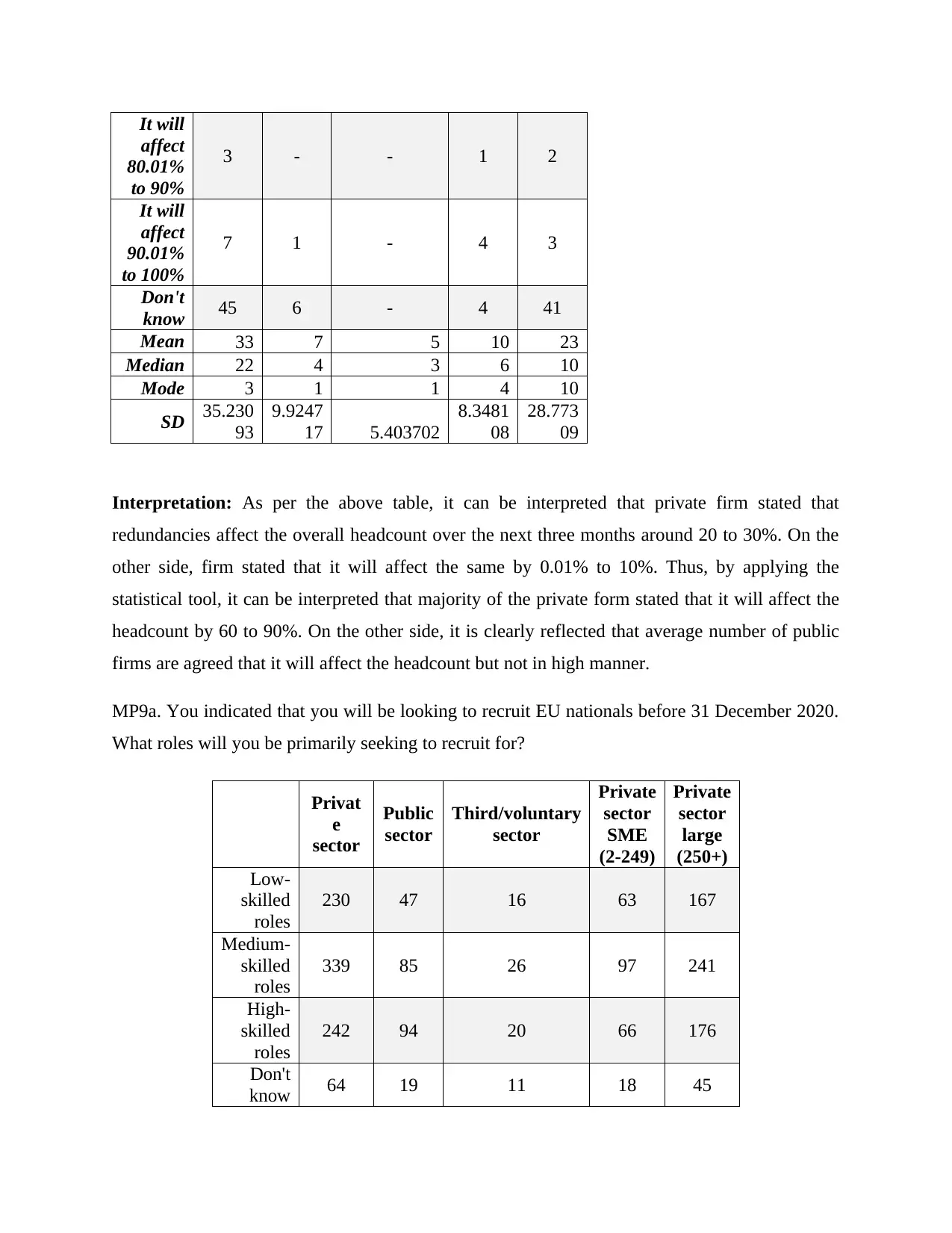
It will
affect
80.01%
to 90%
3 - - 1 2
It will
affect
90.01%
to 100%
7 1 - 4 3
Don't
know 45 6 - 4 41
Mean 33 7 5 10 23
Median 22 4 3 6 10
Mode 3 1 1 4 10
SD 35.230
93
9.9247
17 5.403702
8.3481
08
28.773
09
Interpretation: As per the above table, it can be interpreted that private firm stated that
redundancies affect the overall headcount over the next three months around 20 to 30%. On the
other side, firm stated that it will affect the same by 0.01% to 10%. Thus, by applying the
statistical tool, it can be interpreted that majority of the private form stated that it will affect the
headcount by 60 to 90%. On the other side, it is clearly reflected that average number of public
firms are agreed that it will affect the headcount but not in high manner.
MP9a. You indicated that you will be looking to recruit EU nationals before 31 December 2020.
What roles will you be primarily seeking to recruit for?
Privat
e
sector
Public
sector
Third/voluntary
sector
Private
sector
SME
(2-249)
Private
sector
large
(250+)
Low-
skilled
roles
230 47 16 63 167
Medium-
skilled
roles
339 85 26 97 241
High-
skilled
roles
242 94 20 66 176
Don't
know 64 19 11 18 45
affect
80.01%
to 90%
3 - - 1 2
It will
affect
90.01%
to 100%
7 1 - 4 3
Don't
know 45 6 - 4 41
Mean 33 7 5 10 23
Median 22 4 3 6 10
Mode 3 1 1 4 10
SD 35.230
93
9.9247
17 5.403702
8.3481
08
28.773
09
Interpretation: As per the above table, it can be interpreted that private firm stated that
redundancies affect the overall headcount over the next three months around 20 to 30%. On the
other side, firm stated that it will affect the same by 0.01% to 10%. Thus, by applying the
statistical tool, it can be interpreted that majority of the private form stated that it will affect the
headcount by 60 to 90%. On the other side, it is clearly reflected that average number of public
firms are agreed that it will affect the headcount but not in high manner.
MP9a. You indicated that you will be looking to recruit EU nationals before 31 December 2020.
What roles will you be primarily seeking to recruit for?
Privat
e
sector
Public
sector
Third/voluntary
sector
Private
sector
SME
(2-249)
Private
sector
large
(250+)
Low-
skilled
roles
230 47 16 63 167
Medium-
skilled
roles
339 85 26 97 241
High-
skilled
roles
242 94 20 66 176
Don't
know 64 19 11 18 45
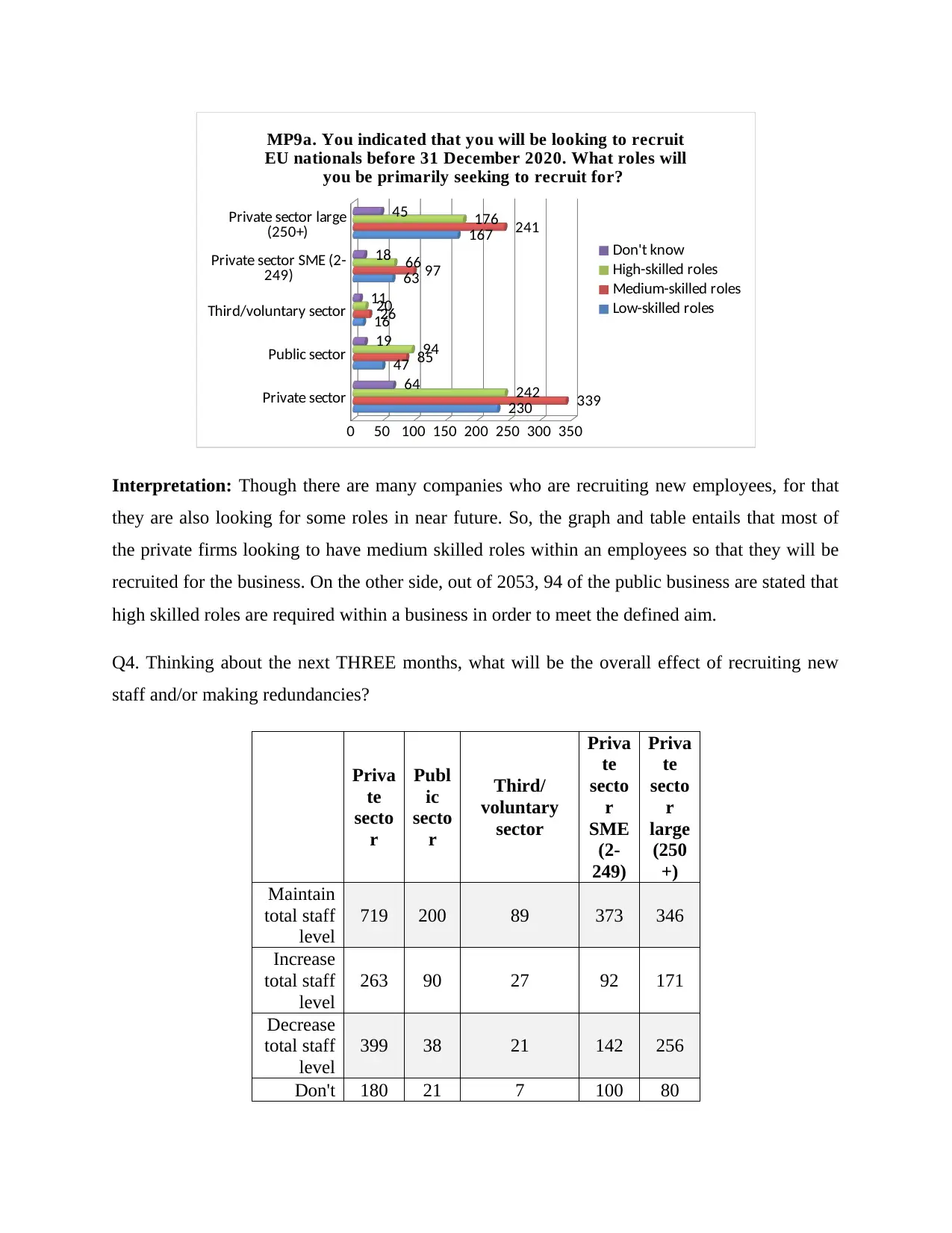
Private sector
Public sector
Third/voluntary sector
Private sector SME (2-
249)
Private sector large
(250+)
0 50 100 150 200 250 300 350
230
47
16
63
167
339
85
26
97
241
242
94
20
66
176
64
19
11
18
45
MP9a. You indicated that you will be looking to recruit
EU nationals before 31 December 2020. What roles will
you be primarily seeking to recruit for?
Don't know
High-skilled roles
Medium-skilled roles
Low-skilled roles
Interpretation: Though there are many companies who are recruiting new employees, for that
they are also looking for some roles in near future. So, the graph and table entails that most of
the private firms looking to have medium skilled roles within an employees so that they will be
recruited for the business. On the other side, out of 2053, 94 of the public business are stated that
high skilled roles are required within a business in order to meet the defined aim.
Q4. Thinking about the next THREE months, what will be the overall effect of recruiting new
staff and/or making redundancies?
Priva
te
secto
r
Publ
ic
secto
r
Third/
voluntary
sector
Priva
te
secto
r
SME
(2-
249)
Priva
te
secto
r
large
(250
+)
Maintain
total staff
level
719 200 89 373 346
Increase
total staff
level
263 90 27 92 171
Decrease
total staff
level
399 38 21 142 256
Don't 180 21 7 100 80
Public sector
Third/voluntary sector
Private sector SME (2-
249)
Private sector large
(250+)
0 50 100 150 200 250 300 350
230
47
16
63
167
339
85
26
97
241
242
94
20
66
176
64
19
11
18
45
MP9a. You indicated that you will be looking to recruit
EU nationals before 31 December 2020. What roles will
you be primarily seeking to recruit for?
Don't know
High-skilled roles
Medium-skilled roles
Low-skilled roles
Interpretation: Though there are many companies who are recruiting new employees, for that
they are also looking for some roles in near future. So, the graph and table entails that most of
the private firms looking to have medium skilled roles within an employees so that they will be
recruited for the business. On the other side, out of 2053, 94 of the public business are stated that
high skilled roles are required within a business in order to meet the defined aim.
Q4. Thinking about the next THREE months, what will be the overall effect of recruiting new
staff and/or making redundancies?
Priva
te
secto
r
Publ
ic
secto
r
Third/
voluntary
sector
Priva
te
secto
r
SME
(2-
249)
Priva
te
secto
r
large
(250
+)
Maintain
total staff
level
719 200 89 373 346
Increase
total staff
level
263 90 27 92 171
Decrease
total staff
level
399 38 21 142 256
Don't 180 21 7 100 80
⊘ This is a preview!⊘
Do you want full access?
Subscribe today to unlock all pages.

Trusted by 1+ million students worldwide
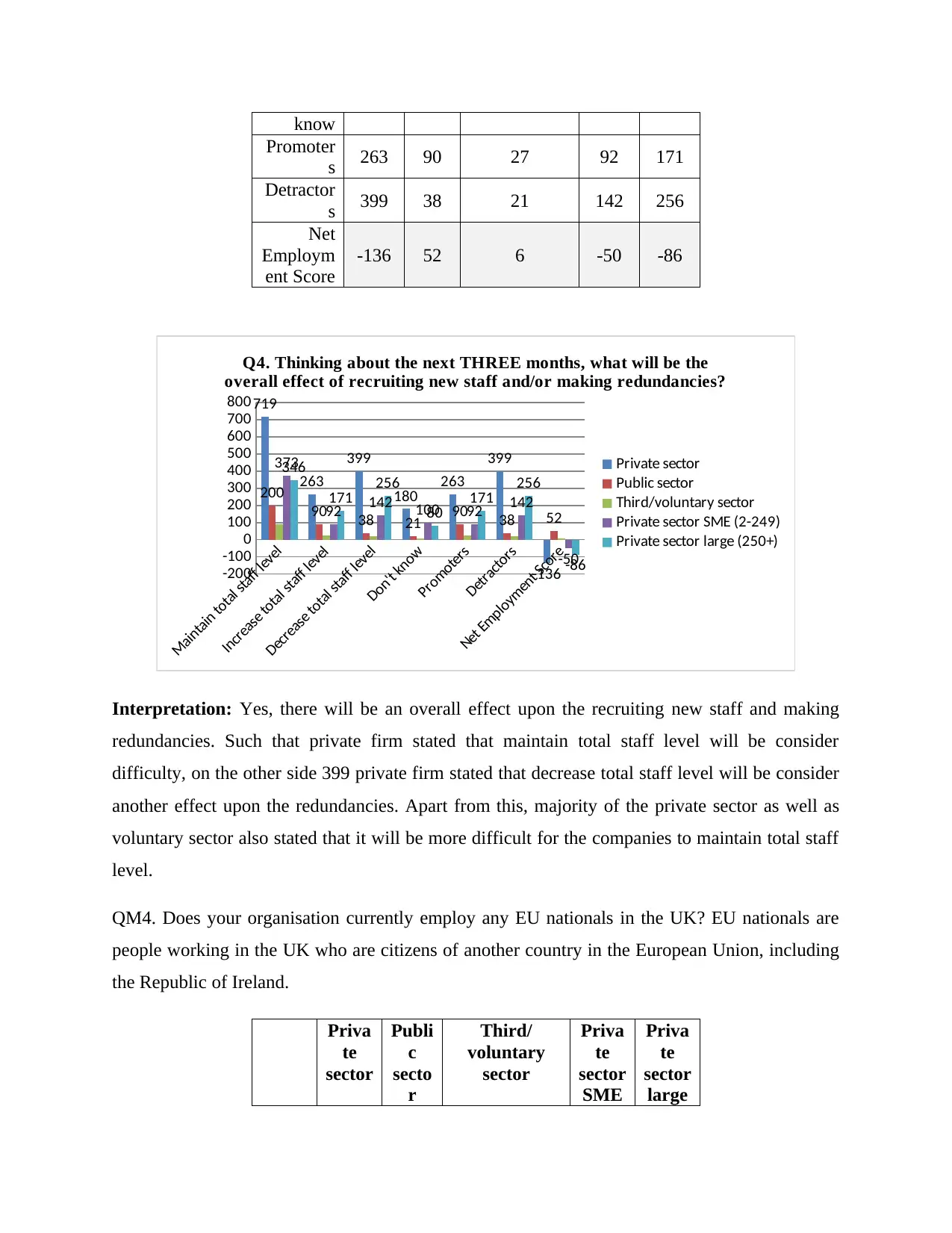
know
Promoter
s 263 90 27 92 171
Detractor
s 399 38 21 142 256
Net
Employm
ent Score
-136 52 6 -50 -86
Maintain total staff level
Increase total staff level
Decrease total staff level
Don't know
Promoters
Detractors
Net Employment Score
-200
-100
0
100
200
300
400
500
600
700
800 719
263
399
180 263
399
-136
200
90 38 21 90 38 52
373
92 142 100 92 142
-50
346
171 256
80 171 256
-86
Q4. Thinking about the next THREE months, what will be the
overall effect of recruiting new staff and/or making redundancies?
Private sector
Public sector
Third/voluntary sector
Private sector SME (2-249)
Private sector large (250+)
Interpretation: Yes, there will be an overall effect upon the recruiting new staff and making
redundancies. Such that private firm stated that maintain total staff level will be consider
difficulty, on the other side 399 private firm stated that decrease total staff level will be consider
another effect upon the redundancies. Apart from this, majority of the private sector as well as
voluntary sector also stated that it will be more difficult for the companies to maintain total staff
level.
QM4. Does your organisation currently employ any EU nationals in the UK? EU nationals are
people working in the UK who are citizens of another country in the European Union, including
the Republic of Ireland.
Priva
te
sector
Publi
c
secto
r
Third/
voluntary
sector
Priva
te
sector
SME
Priva
te
sector
large
Promoter
s 263 90 27 92 171
Detractor
s 399 38 21 142 256
Net
Employm
ent Score
-136 52 6 -50 -86
Maintain total staff level
Increase total staff level
Decrease total staff level
Don't know
Promoters
Detractors
Net Employment Score
-200
-100
0
100
200
300
400
500
600
700
800 719
263
399
180 263
399
-136
200
90 38 21 90 38 52
373
92 142 100 92 142
-50
346
171 256
80 171 256
-86
Q4. Thinking about the next THREE months, what will be the
overall effect of recruiting new staff and/or making redundancies?
Private sector
Public sector
Third/voluntary sector
Private sector SME (2-249)
Private sector large (250+)
Interpretation: Yes, there will be an overall effect upon the recruiting new staff and making
redundancies. Such that private firm stated that maintain total staff level will be consider
difficulty, on the other side 399 private firm stated that decrease total staff level will be consider
another effect upon the redundancies. Apart from this, majority of the private sector as well as
voluntary sector also stated that it will be more difficult for the companies to maintain total staff
level.
QM4. Does your organisation currently employ any EU nationals in the UK? EU nationals are
people working in the UK who are citizens of another country in the European Union, including
the Republic of Ireland.
Priva
te
sector
Publi
c
secto
r
Third/
voluntary
sector
Priva
te
sector
SME
Priva
te
sector
large
Paraphrase This Document
Need a fresh take? Get an instant paraphrase of this document with our AI Paraphraser
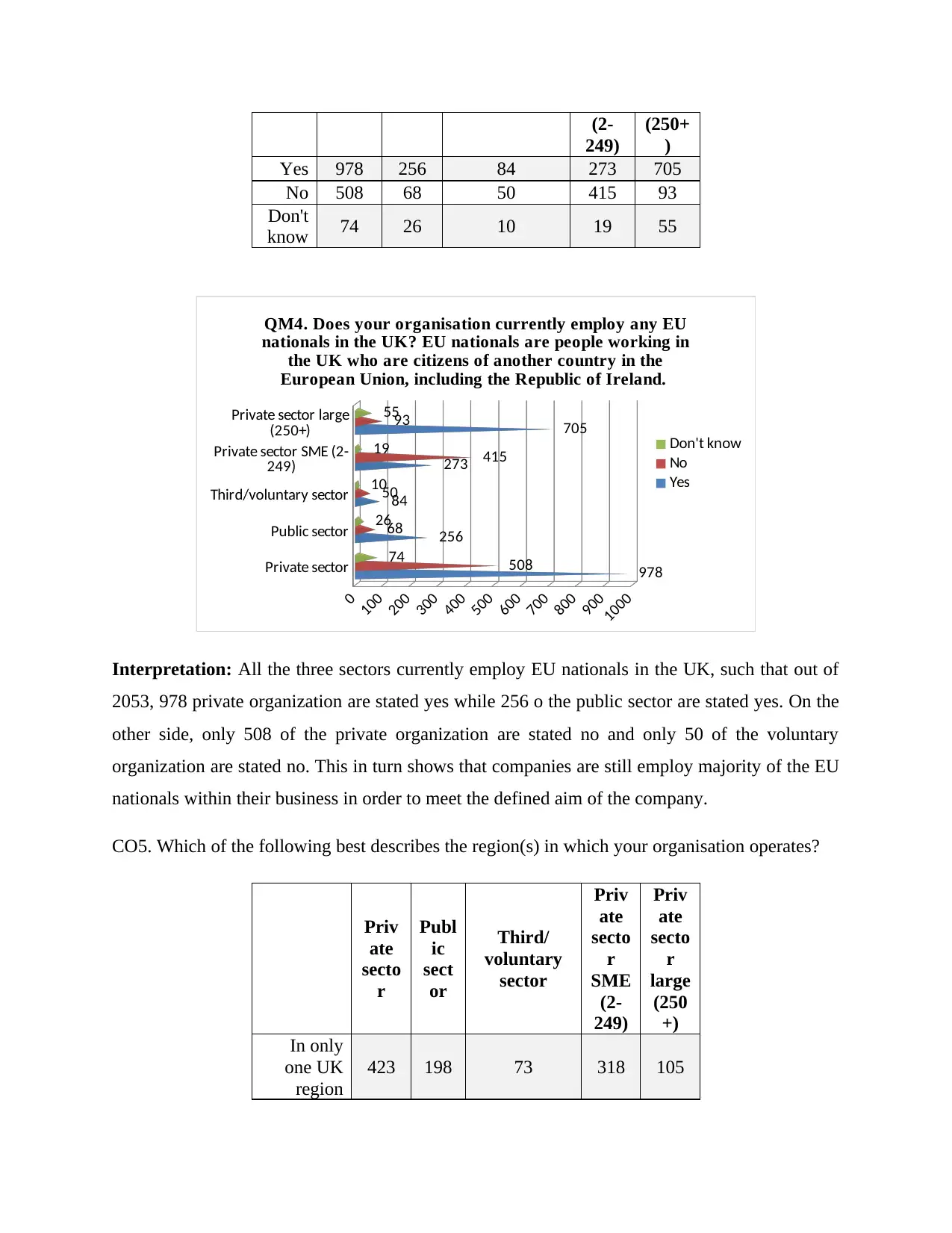
(2-
249)
(250+
)
Yes 978 256 84 273 705
No 508 68 50 415 93
Don't
know 74 26 10 19 55
Private sector
Public sector
Third/voluntary sector
Private sector SME (2-
249)
Private sector large
(250+)
0
100
200
300
400
500
600
700
800
900
1000
978
256
84
273
705
508
68
50
415
93
74
26
10
19
55
QM4. Does your organisation currently employ any EU
nationals in the UK? EU nationals are people working in
the UK who are citizens of another country in the
European Union, including the Republic of Ireland.
Don't know
No
Yes
Interpretation: All the three sectors currently employ EU nationals in the UK, such that out of
2053, 978 private organization are stated yes while 256 o the public sector are stated yes. On the
other side, only 508 of the private organization are stated no and only 50 of the voluntary
organization are stated no. This in turn shows that companies are still employ majority of the EU
nationals within their business in order to meet the defined aim of the company.
CO5. Which of the following best describes the region(s) in which your organisation operates?
Priv
ate
secto
r
Publ
ic
sect
or
Third/
voluntary
sector
Priv
ate
secto
r
SME
(2-
249)
Priv
ate
secto
r
large
(250
+)
In only
one UK
region
423 198 73 318 105
249)
(250+
)
Yes 978 256 84 273 705
No 508 68 50 415 93
Don't
know 74 26 10 19 55
Private sector
Public sector
Third/voluntary sector
Private sector SME (2-
249)
Private sector large
(250+)
0
100
200
300
400
500
600
700
800
900
1000
978
256
84
273
705
508
68
50
415
93
74
26
10
19
55
QM4. Does your organisation currently employ any EU
nationals in the UK? EU nationals are people working in
the UK who are citizens of another country in the
European Union, including the Republic of Ireland.
Don't know
No
Yes
Interpretation: All the three sectors currently employ EU nationals in the UK, such that out of
2053, 978 private organization are stated yes while 256 o the public sector are stated yes. On the
other side, only 508 of the private organization are stated no and only 50 of the voluntary
organization are stated no. This in turn shows that companies are still employ majority of the EU
nationals within their business in order to meet the defined aim of the company.
CO5. Which of the following best describes the region(s) in which your organisation operates?
Priv
ate
secto
r
Publ
ic
sect
or
Third/
voluntary
sector
Priv
ate
secto
r
SME
(2-
249)
Priv
ate
secto
r
large
(250
+)
In only
one UK
region
423 198 73 318 105
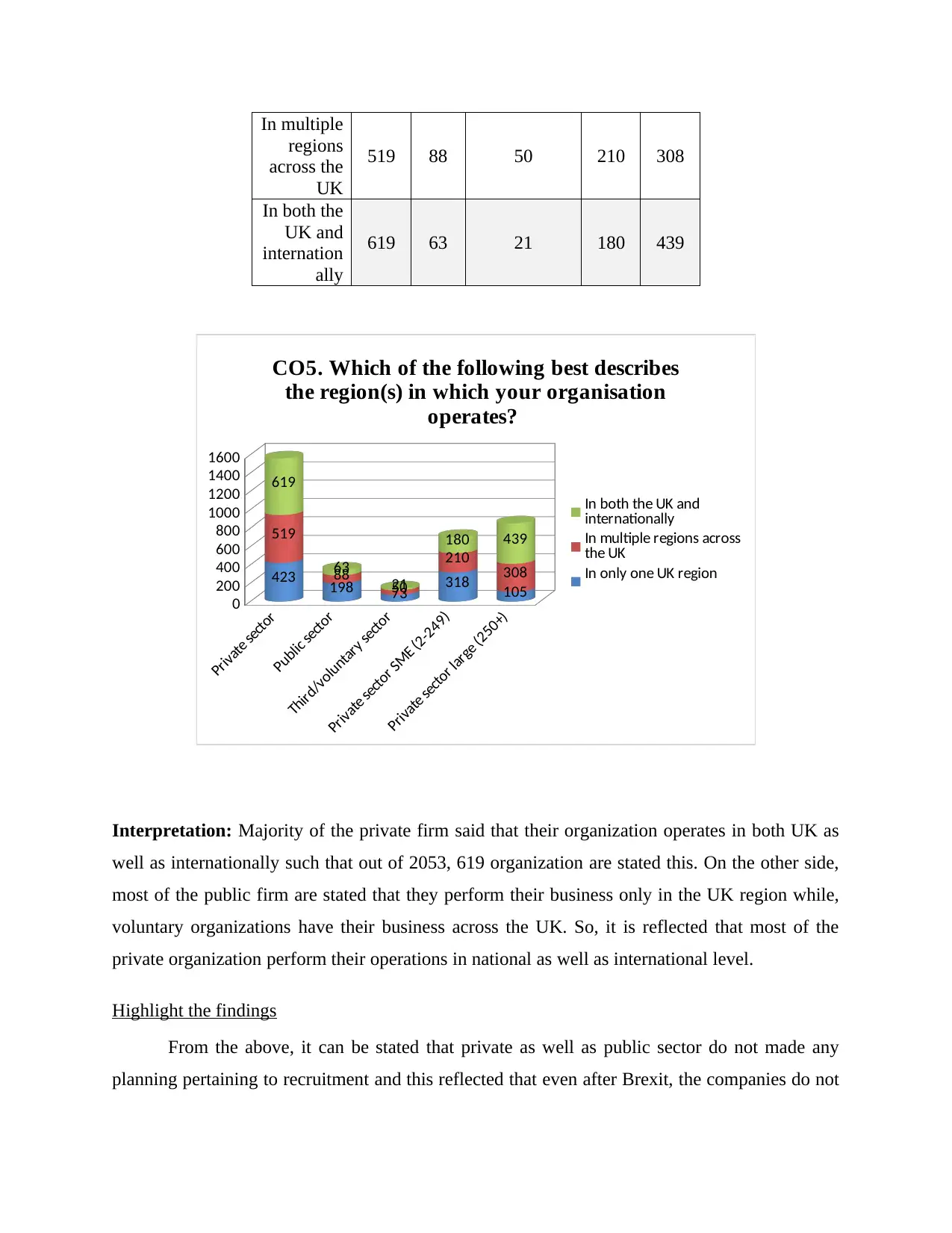
In multiple
regions
across the
UK
519 88 50 210 308
In both the
UK and
internation
ally
619 63 21 180 439
Private sector
Public sector
Third/voluntary sector
Private sector SME (2-249)
Private sector large (250+)
0
200
400
600
800
1000
1200
1400
1600
423 198 73 318 105
519
88 50
210 308
619
63
21
180 439
CO5. Which of the following best describes
the region(s) in which your organisation
operates?
In both the UK and
internationally
In multiple regions across
the UK
In only one UK region
Interpretation: Majority of the private firm said that their organization operates in both UK as
well as internationally such that out of 2053, 619 organization are stated this. On the other side,
most of the public firm are stated that they perform their business only in the UK region while,
voluntary organizations have their business across the UK. So, it is reflected that most of the
private organization perform their operations in national as well as international level.
Highlight the findings
From the above, it can be stated that private as well as public sector do not made any
planning pertaining to recruitment and this reflected that even after Brexit, the companies do not
regions
across the
UK
519 88 50 210 308
In both the
UK and
internation
ally
619 63 21 180 439
Private sector
Public sector
Third/voluntary sector
Private sector SME (2-249)
Private sector large (250+)
0
200
400
600
800
1000
1200
1400
1600
423 198 73 318 105
519
88 50
210 308
619
63
21
180 439
CO5. Which of the following best describes
the region(s) in which your organisation
operates?
In both the UK and
internationally
In multiple regions across
the UK
In only one UK region
Interpretation: Majority of the private firm said that their organization operates in both UK as
well as internationally such that out of 2053, 619 organization are stated this. On the other side,
most of the public firm are stated that they perform their business only in the UK region while,
voluntary organizations have their business across the UK. So, it is reflected that most of the
private organization perform their operations in national as well as international level.
Highlight the findings
From the above, it can be stated that private as well as public sector do not made any
planning pertaining to recruitment and this reflected that even after Brexit, the companies do not
⊘ This is a preview!⊘
Do you want full access?
Subscribe today to unlock all pages.

Trusted by 1+ million students worldwide
1 out of 15
Related Documents
Your All-in-One AI-Powered Toolkit for Academic Success.
+13062052269
info@desklib.com
Available 24*7 on WhatsApp / Email
![[object Object]](/_next/static/media/star-bottom.7253800d.svg)
Unlock your academic potential
Copyright © 2020–2026 A2Z Services. All Rights Reserved. Developed and managed by ZUCOL.





